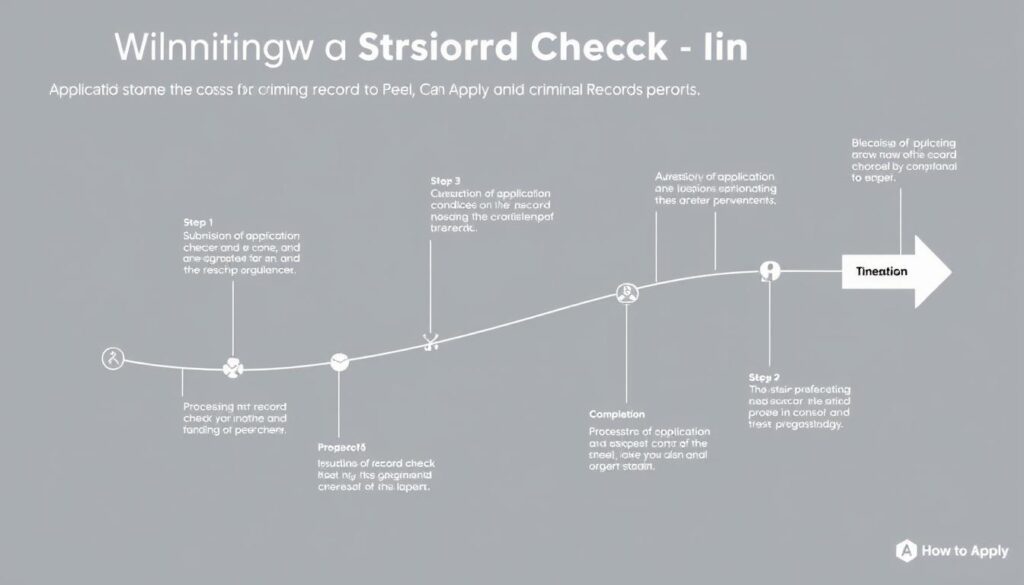Did you know over 100,000 background screenings occur annually through Peel’s local authorities? This process directly affects job prospects, volunteer eligibility, and professional licensing across Ontario. Knowing regional protocols helps you avoid delays.
Ontario’s Police Record Checks Reform Act ensures consistent standards for these requests. Whether you apply through police services or approved partners, proper identification and consent forms are mandatory. Third-party options exist for specific needs.
All completed documents must be collected at One Peel Plaza, even if submitted online. Organizations decide whether the issue date aligns with their policies. Provincial laws strictly control what details appear in your results and how they’re shared.
Your screening remains valid from its completion date onward. Prepare two government-issued IDs and allow time for processing. The system prioritizes transparency while protecting personal privacy.
Understanding Criminal Record Checks in Canada
Canadian organizations use standardized screenings to protect vulnerable populations and maintain workplace safety. These evaluations help employers make informed decisions while respecting individual privacy rights.

Core Objectives of Screening Processes
Background reviews serve multiple essential functions:
- Identifying potential risks in roles involving financial responsibility
- Ensuring compliance with industry-specific regulations
- Maintaining public trust in education and healthcare sectors
Ontario’s Regulatory Environment
The Police Record Checks Reform Act establishes clear rules for what details authorities can share. This law created three official screening levels:
- Basic conviction history
- Expanded judicial data
- Specialized protection for vulnerable groups
Non-conviction details generally remain confidential except in specific circumstances. Mental health interactions with authorities don’t appear in standard reports. Organizations must justify why they need particular data types through formal requests.
“Balancing public safety with personal privacy requires precise legal boundaries,” explains a Ministry of Community Safety representative.
About the Police Record Check Process
Navigating screening requirements starts with understanding your role in the system. Every request begins with your authorization – no organization can initiate a police record check without your direct involvement. This safeguards your privacy while maintaining transparency.

Consent and Identification Requirements
You must provide written permission before any screening occurs. Employers or volunteer coordinators cannot bypass this step. Your signature confirms awareness of what information will be shared and why.
Prepare two valid IDs when submitting your request. One must show your photo and current address. Common options include a driver’s licence paired with a utility bill or health card. Non-residents may need additional documentation.
Specify the exact purpose of your application. Different roles require varying clearance levels. A childcare position might demand stricter checks than a retail job. Contact the requesting organization first to confirm their standards.
Submission methods vary by region. Many police services offer online portals for basic requests. In-person visits ensure faster processing for urgent cases. Mailed applications work but extend timelines.
“Proper preparation prevents delays,” notes a Toronto Police Service representative. “Double-check your documents before submission.”
Some situations require extra paperwork. You might need a letter from the employer explaining why they need your screening results. Keep copies of all submitted materials for your records.
Criminal Record Check Peel: Essential Information
Residents of Saint John must meet specific criteria when requesting official screenings through local authorities. The Saint John Police Force mandates that applicants live within their jurisdiction to qualify. This ensures resources focus on community needs while maintaining efficient service delivery.

Your application process involves two critical steps: identity verification and mandatory pickup at One Peel Plaza. Whether you submit online or in person, all completed documents are collected at this central location. Prepare government-issued photo ID and proof of address to avoid delays.
| Service Type | Fee (CAD) | Processing Time | Notes |
|---|---|---|---|
| Standard Employment | $35.00 | 10 business days | Tax included |
| Non-Profit Volunteers | $10.00 | 10 business days | Requires organization letter |
| Expedited Requests | $100.00 | 5 business days | Subject to availability |
Authentication relies on personal credit file details, meaning you cannot apply for others. The system cross-references your submitted information with financial records for security purposes. Allow full processing timelines – no same-day options exist even for urgent cases.
“Always confirm documentation requirements before submitting,” advises a Saint John Police representative. “Missing paperwork causes 30% of application delays.”
Volunteers save significantly with reduced fees but must provide proof of their role. Keep copies of all submitted materials and track your application status through police service portals.
Vulnerable Sector and Additional Record Checks
Working with sensitive populations demands specialized screening protocols. Canada’s enhanced verification processes ensure safety while respecting privacy rights. These measures apply to roles where trust and responsibility directly impact vulnerable groups.
Differences Between Check Types
Three primary screenings exist for employment and volunteer roles:
- Basic checks: Confirm convictions without additional context
- Judicial reviews: Include pending charges and court orders
- Vulnerable sector checks: Reveal pardoned sexual offences and mental health findings
The third option provides the deepest scrutiny. It uncovers details other screenings omit, like non-conviction data in cases involving authority over others.
When a Vulnerable Sector Check is Required
You’ll need this enhanced screening for positions involving:
- Direct supervision of minors (under 18)
- Care for elderly or disabled individuals
- Leadership roles in youth organizations
Fingerprint verification often becomes mandatory here. This step prevents identity errors when names match pardoned offenders. Expect longer processing times compared to standard screenings.
“These checks balance community safety with rehabilitation principles,” states a Public Safety Canada advisor. “They’re tailored for high-responsibility roles.”
Social workers, teachers, and healthcare providers typically require this level of clearance. Always confirm specific needs with your employer before applying.
How to Apply and What to Expect
Initiating your background screening requires understanding key steps and documentation. Proper preparation ensures smooth interactions with authorities and requesting organizations. Follow these guidelines to navigate requirements efficiently.

Application Process Overview
Start by obtaining an official organization letter detailing your role and screening purpose. This document must include the requester’s contact details and position description. Submit it with two valid IDs and completed consent forms through approved channels.
Specify whether you need results for employment, volunteer work, or other purposes. Multiple copies can be requested upfront if you’ll share results with several agencies. Federal employees should inquire about potential fee exemptions during submission.
Processing Times and Fee Details
Standard requests take 10 business days, while expedited service reduces this to five days. Fees vary based on your screening’s urgency and purpose:
| Purpose | Cost (CAD) | Timeline | Key Notes |
|---|---|---|---|
| Job Applications | $35.00 | 10 days | Includes taxes |
| Volunteer Roles | $10.00 | 10 days | Requires proof of position |
| Urgent Requests | $100.00 | 5 days | Subject to approval |
Your application’s submission date becomes the official issue date for reference. Employers determine whether this aligns with their policies. Always verify requirements with the involved agency beforehand.
“Double-check your paperwork against our checklist online,” advises a Peel Regional Police coordinator. “Incomplete applications account for most delays.”
Track progress through your chosen service provider’s portal. Contact their support team if you encounter unexpected hurdles or need status updates.
Tips for a Successful Record Check Application
Understanding specific eligibility criteria helps avoid common pitfalls in the application process. Your preparation directly impacts how quickly you receive results and whether organizations accept your documentation.

Best Practices for a Smooth Submission
Confirm basic requirements before starting. Online submissions need established credit history for identity verification. If you’re under 18 or have lived in Canada less than a year, prepare for in-person submission with extra paperwork like proof of residency.
Youth-related records under the Youth Criminal Justice Act appear only in screenings for federal, provincial, or municipal roles. This protects privacy while meeting public sector safety standards. Private employers typically can’t access this data.
Review results thoroughly before sharing them. You have the right to dispute inaccuracies or request removal of non-conviction details. Submit reconsideration forms within 30 days if information seems improperly included.
“Always cross-reference your documents with official guidelines,” advises a Canadian legal advisor. “Errors caught early save weeks of delays.”
Note that pardons and court orders follow strict disclosure rules. These vary based on screening types and organizational policies. Keep physical copies of all submissions until your process concludes.
Conclusion
Navigating official screenings requires understanding both your responsibilities and legal protections. Organizations requesting police record reviews must follow Ontario’s human rights standards, ensuring fair treatment throughout hiring processes. Your results always come to you first – this lets you confirm accuracy before sharing details with employers.
Successful applications depend on selecting the right screening type and submitting complete documentation. Remember that federal guidelines prevent discrimination based on unrelated personal history. You maintain control over who sees your information and can challenge errors within 30 days.
For Canadians abroad needing verifications, contact RCMP directly rather than provincial services. Domestic requests follow strict privacy rules that balance safety needs with individual rights. Keep copies of all paperwork until your process concludes.
By following these steps, you ensure efficient processing while protecting your legal interests. Always verify requirements with authorities if unsure about specific situations.

